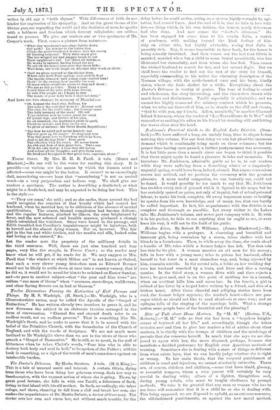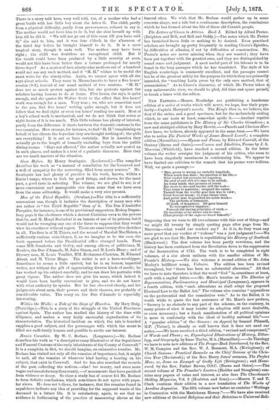Bits of Talk about Home Matters. By "H. H." (Boston,
U.S., Roberts.)—" H. H." tells us that she has been a "hopeless knight- errant of boyhood all her life," and accordingly, though she takes occasion now and then to give her readers a bit of advice about other matters, it is chiefly with the wrongs of children and the misdoings of parents that she concerns herself. In much that she says we are dis- posed to agree with her, the more disposed, perhaps, because she manifests a decided preference for English over 4merican methods of training. Sometimes she is dealing with a.state of things so different from what exists litre, that we can hardly judge whether she is right or wrong. To her main thesis, that the corporal punishment of children is cruel and injurious, we cannot absolutely subscribe. There are, of course, children and children,—some that have timid, gloomy, or resentful tempers, whom a wise parent will certainly be very careful in dealing with ; others of a lighter, thoughtless sort, daring young rebels, who must be taught obedience by prompt methods. We take it for granted that any man or woman who has to -use force will remember that it is a child he or she is dealing with. This being supposed, we are disposed to uphold, as an extreme resource, the old-fashioned punishments, as against the new moral method.
There is a story told here, very well told, too, of a mother who had a great battle with her little boy about the letter G. The child, partly from a physical difficulty, partly from perverseness, refused to say it. The mother would not force him to do it, but she shut herself up with him till he did it. "We will not go out of this room till you have said it," she said to him, and it was four o'clock in the afternoon of the third day before he brought himself to do it. It is a most tragical story, though it ends welL The mother may have been right ; the child was doubtless an exceptional child. But if the result could have been produced by a little severity at once, would not this have boon bettor than a torture prolonged for nearly three days ? As a matter of fact, ninety-nine mothers out of a hundred could not use any such method, and if "H. H." wishes to be useful she must write for the ninety-nine. Again, we cannot agree with all she says about schools. They seom in Massachusetts to have a five hours' session (9-2), instead of our usual method of two sessions. "H. H." does not so much protest against this, but she protests against the scholars having lessons to do at home. Five hours, she says, is quite enough, and she quotes Sir Walter Scott to the effect that five hours' work was enough for a man. Very true ; we, who are somewhat used to the pen, find five hours' writing quite enough, but it does not follow that we find eight or even ten hours' reading too much. Most of a boy's school work is mechanical, and we do not think that seven or eight hours of it is too much. This little volume has plenty of interest, partly from the difference it shows between the domestic customs in the two countries. How strange, for instance, to find "H. H." complaining on behalf of her clients the boys that they are thought nothing of ; the girls are everything ! It is not so here certainly. But in America they actually go to the length of formally excluding boys from the public dining-rooms. Boys not allowed," the author actually saw posted up in such places, and makes it a text of a pathetic discourse. Here they are too much masters of the situation.



































 Previous page
Previous page